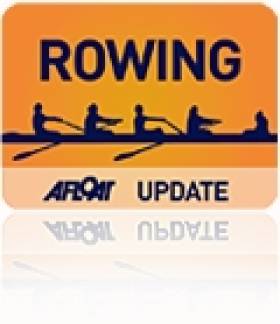Displaying items by tag: De Maas
Cork Crews Rise to the Top at Cork Head
Cork crews saw off rivals from far and near at the Cork rowing Head of the River at the Marina on Saturday. UCC’s men’s senior eight were the fastest men’s crew – by 1.3 seconds from De Maas of Rotterdam, a masters eight. The fastest women’s crew was Cork Boat Club’s junior 18 eight, adjudged just .8 of a second quicker than UCD’s women’s senior eight. The fastest men’s single sculler was John Keohane of Lee Valley and Karen Corcoran-O’Hare of Shandon was the fastest women’s single sculler.
Cork Head of the River, The Marina, Cork, Saturday
Overall: 1 UCC men’s senior eight 12 minutes 6.7 seconds, 2 De Maas, Rotterdam men’s masters eight 12:08.0, 3 UCC men’s novice eight 12:25.9, 4 UCD men’s novice eight 12:42.4, 5 Presentation College men’s junior eight 12:44.3, 6 Muckross intermediate eight 12:49.9.
Men, Eight – Senior: UCC 12:06.7. Intermediate: Muckross 12:49.9. Novice: UCC 12:25.9. Junior: Presentation 12:44.3. Junior 16: Cork 13:21.2. Masters: De Maas 12:08.0.
Fours – Senior: Cork/Garda 12:53.6. Intermediate: UCC 13:40.6. Novice: Cappoquin 13:43.9. Junior 18, coxed: Presentation 13:04.0
Pair – Junior 18: Presentation 14:58.7. Masters: De Maas 13:09.9. Coastal – Novice: Ahakista 17:28.7.
Sculling, Quadruple – Senior: Shannon 13:50.8. Novice: Shannon 15:07.4. Junior 18: Cork 13:05.3. Junior 16: Cork 13:15.2.
Double – Intermediate: Cork IT 13:41.6. Junior 18: Clonmel 13:53.9. Junior 16: St Michael’s 15:04.4. Coastal – Novice: Kilmacsimon 16:17.2.
Single – Senior: Lee Valley (J Keohane) 14:16.4. Intermediate: Lee (O’Connell) 14:53.4. Novice: Lee (O’Connell) 14:37.9. Junior 18: Workmen’s (Burns) 14:33.0. Junior 16: Shandon (Casey) 15:08.9. Masters: Skibbereen (Barry) 15:40.07. Coastal – Novice: Kilmacsimon 17:33.6
Women – Overall: 1 Cork junior eight 13:40.0, 2 UCD senior eight 13:40.8, 3 St Michael’s junior eight 13:54.1.
Eight – Senior: UCD 13:40.8. Novice: UCC 14:25.4. Junior 18: 1 Cork 13:40.0. Junior 16: Clonmel 16:21.0.
Four – Senior: Muckross 14:15.9. Intermediate: UCC 17:00.9. Novice: UCC 16:29.8. Masters: Skibbereen 22:34.9.
Pair – Junior 18: St Michael’s 15:00.2.
Sculling, Quadruple - Novice: Shannon 15:51.4. Junior 16: St Michael’s 15:16.5.
Double – Intermediate: UCC 16:15.1. Junior 18: Cork 14:43.9. Junior 16: Lee 15:42.3. Masters: Cork 15:38.3.
Single – Senior: Intermediate: Shandon (K Corcoran-O’Hare) 15:39.7. Junior 18: Lee (Kearney) 16:52.1. Junior 16: Lee (Hamel) 16:13.6. Masters: Cork (Crowley) 17:49.2.
Coastal: 1 Kilmacsimon men’s novice double scull 16:17.2, 2 Ahakista men’s novice quadruple coxed scull 17:28.7.
Click this link for Irish Rowing detailsClick this link for the Latest Rowing News
























































